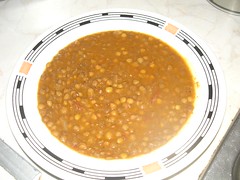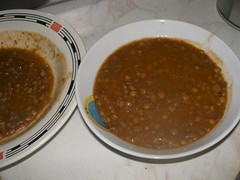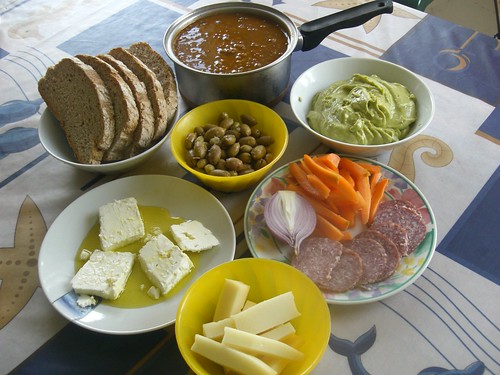A growing sector of Greek society is facing poverty. The poorest people in Greece are believed to be young people and farmers (ie people who make less than 500 euro a month). These figures usually don't include statistics for economic migrants, because of the difficulty of tracking them. Young people are more likely to continue to live at home rather than try to survive independently on such a low income; even if they did live away from home and took on a second job to supplement their income, it is highly unlikely that they will be living in the countryside or occupying themselves with growing their own food. If they have to buy all their food needs, they'll easily get into trouble financially. As it is, the younger working citizens of Greece are victims of their own fate: a combination of high unemployment rates and low salaries for young people entering the workforce means that they will spend a good proportion of their (or others') income on food, and they will need to rely on others (the most common ones being their parents and village produce from their area) to provide them with food. It is not at all uncommon for mothers and grandmothers to cook meals and courier them to their offspring who are studying or working far away from home. If this sounds kind of strange to you, just remember the two factors of Greek life that I have already mentioned: unemployment and extremely low starting salaries (for a European Union country who was part of the original EU-15).
Poverty doesn't necessarily go hand in hand with starvation and hunger. Farmers may be short of cash, but they are rich in produce, especially those living in Crete. In fact, I think it is very difficult to starve in Crete. We are surrounded by food, and we love to cook it and share it, as there is always plenty to go round. No wonder we are an island full of rotund inhabitants. Maybe this is linked to our past; there were times when people found it very difficult to find enough food to feed their family, mainly because there were too many mouths to feed in the first place and not enough hands to do the work required to keep them fed.
When dining with Cretans (and most other non-urban Greeks), if your plate is ever empty, your hosts will magically fill it up for you without asking you first if you want any seconds. If you insist that you don't want any more, it might be regarded as a way of saying that you didn't like the food. There is a simple remedy to that: just keep your plate full so that no one can pile any more food onto it. And if you're a meat-eater, make sure to pick cuts of meat with lots of bones in them so that your hosts can see the remnants, otherwise they'll start complaining: "Ma den eheis faei TIPOTA!" (but you haven't eaten ANYTHING!).
As a young child growing up in the 1970s in Wellington, I remember being specifically told by my Cretan immigrant mother that if I didn't eat ALL the potatoes (or rice or pasta) on my plate, I wouldn't be given any of the meat that was cooked with the meal. Not that I was such a great carnivore, but I did want to eat my share of that roast chicken or T-bone steak or tasty sausage. So I dutifully ate ALL the potatoes (or rice or pasta) on my plate so that I would rightfully year my share of the best bit. Of course, by the time I had eaten ALL those potatoes (or rice or pasta), I was probably stuffed and had eaten more food than I should have eaten, so that the meat I ate was not a necessary part of my diet after all. It took me a long time to get over the idea that I didn't actually have to eat everything on my plate.
Overfeeding is still an issue in Crete. Unfortunately, the repercussions of this can be seen in the rising obesity levels. This is the personal responsibility of the individual - but not in the case of children. Obesity levels in children can be blamed on their parents and guardians just as much as the fast-food no-exercise culture they are surrounded by. At the same time, I am intrigued with just how much bad food surrounds highly developed societies. The less developed world seems to have a highly developed sense of what is edible, while people in the most highly developed countries of the world are content to serve children highly processed food with chemical additives, overloaded with calories, and then blame obesity levels in their children on low levels of exercise.
My children are now exhibiting signs of fussy eating habits. Although there is no question of short order cooking in my house, there have recently been tantrum eruptions at the table. My daughter has started going off milk, no matter how much I plead with her to finish her morning glass before she goes to school. My son still won't touch anything that looks like a plant (which is why I grate a lot of vegetables into bean or mince dishes), but he'll lick his plate clean if you place a bowl of potatoes (or rice or pasta - high energy food) before him. Bean dishes were once very popular with my children; now they are being increasingly seen as old-fashioned and boring meals.
I don't want to be responsible for creating obese children. Some people say that the obesity issue in the Western world is simply a way to propagate discrimination against fat people. What a load of crap. It is not a very pretty sight to see a ballooned stomach hanging over a child's elastic waistline. Neither is it a pretty sight to see this kind of child running around the school playground with a packet of crisps in his hand. And I'll say it again, I don't want fat children. Admittedly, my children were never gluttons, they have never looked overweight, and they generally don't consume huge quantities at each meal time. But they are still too young to make informed food choices, and if presented with a packet of potato crisps, pizza and other high-carb (ie high-energy) food, they will over-indulge in it, and put aside the healthier options. I still cook, and they still eat my food, but I have had to make some changes in the way I serve the meals to reduce the general moaning and groaning.
Every morning, the children have a glass of milk in their favorite milk cup. This was a way of enticing them to drink it all; after all, it was their favorite cup. Now they are complaining that it is too much milk, and they refuse to drink it all ("I think I'm going to throw up, Mum"), so i've downsized the cup, showing them the difference in the capacities of each:
I used to serve bean stews in a soup plate which the children now complain holds too much for their stomachs ("Come and feel my tummy, Mum, it's like a balloon"). Knowing when to stop is a good thing, but I don't want to encourage them to leave a lot of food on their plate; it is wasteful, it won't go back into the pot, and the dog will end up eating it. Now I let them choose for themselves the size of their plate. They usually go for a breakfast bowl full of bean stew.


One of my favourite aunts once said to me that a few tablespoons of a loving mother's home-cooked food containing high quality ingredients will do the same amount of good to a growing child as a huge plateful.
And finally, the last problem: Mr Organically Cooked. He likes to see a growing apetite in his children, and will often coax them to eat as much as they can. Thankfully, my sharp tongue severely reprimands him when he overdoes it; it is an aspect I can control concerning his table manners. The real problem is that he is a gourmet eater. Every meal for him is like a feast. He never eats his meal quickly (like his wife), and he has never, ever had a weight problem (ditto). When he sits down to eat, the table is laden with the typical Greek meal accompaniments, besides the main meal for the day. A couple of days ago, I had made lentil stew. I brought out the standard bowl of olives, some feta cheese in olive oil and a couple of slices of graviera cheese (my son refuses to eat feta). I also produced a bowl of guacomole (we had recently been given some avocados by relatives) which is a good side dish for bean stews. There was also the ubiquitous sourdough bread, thick toasted slices. His last act horrified me: he cut some thick fat slices of Italian salami (which only made its way into our fridge after I fell ill; Mr OC went shopping).
You can easily predict what happened on that day. My son ate lots of salami and cheese and bread, complaining soon after that his stomach was full. My daughter went for the avocado dip, the olives and the feta cheese, dipping her bread in the olive oil on the plate of feta. She didn't want her lentils either. In other words, the children ate everything BUT the lentils. My husband was the only one who ate his portion of lentils, while indulging in everything else on the table (if I ate like him, I wouldn't just be overweight, I'd be obese). I had cooked a healthy meal, and it was not eaten simply because of bad food habits. I had every right to be angry. You can imagine my admonitions at the lunch table that day. When presented with a buffet (which is what most Cretan meals are usually like), we will choose only the tasty bits.
There's a simple solution to this problem: reduce the choice available, not for puritanical reasons, but simply to help educate the younger eaters about good food habits which they can hopefully continue with during their more independent lives. And don't forget to maintain a balanced diet as stipulated by food charts, the Mediterranean diet pyramid being appropriate in my case.
©All Rights Reserved/Organically cooked. No part of this blog may be reproduced and/or copied by any means without prior consent from Maria Verivaki.



There's lots of truth in this post, and much of it sounds very very familiar. Being a parent AND spouse requires a deep well of patience..
ReplyDeleteMaria, you've certainly hit the nail on the head here. Obesity is a huge problem in the U.S. Ironically, when I was growing up, particularly in my teen years, there was so much concern about girls being too skinny. Now the pendulum has swung the other way. I know it's more complicated than that, but it's amazing to me not only the junk that folks eat, but also the quantities in which they do it. Everything is supersized. I've got to tell you, though, that the spread here on your table would be right at home in the Italian households I know! My son would chow down on that salami, bread, cheese, and carrots. As long as he tried the lentils, he knows I won't say anything. He'd probably go grab an apple out of the fridge and wash it down with milk. Speaking of which, love the Harry Potter cup! My girls are water drinkers ... no milk at all, and they've never drank milk. They do eat cheese, though, and lots of it. My kids tend to ebb and flow with their food quantities. If they are having a growth spurt, they eat and eat and eat. If not, they just kind of nibble. Your hubby and mine would be great grocery friends ... if he ever goes to the store, he comes home with all sorts of stuff that would never be on my list! *sigh* :-)
ReplyDeleteI totally understand you, Maria. I don't have children yet so I'm trying to imagine what would I do in such situation. My parents never had any problems with me regarding food habits, I would always prefer vegetables over sweets despite the fact I've never been forced to eat them.
ReplyDeleteReducing the choice available is definitely a good solution. I also agree with Laurie about patience. Simply continue doing what you think it's right. From what I've read in your blog so far, I think you are a wonderful mother.
Your post Maria is so informative and full of trues!
ReplyDeleteI do not think that the hooraw about obesity is merely a ploy to increase discrimination against fat people, but it is a fact that one *result* of the hooraw is increased discrimination against fat people.
ReplyDeleteI also think it is worth noting that the "obesity epidemic" is a myth- it was initially a MISTAKE made by the CDC which took hold in popular imagination, and even though the CDC has since said, repeatedly, that they were wrong and there is no obesity epidemic, people like Paula up there are still convinced that "obesity is a huge problem." This is because most people here get all their information from popular news media, which is concerned with ratings and entertainment, not with facts or health.
who is cdc? they are definitely not greek.
ReplyDeletei'm talking about the health problems of people i see living in my own area, the province of hania, crete, with about 60,000 permanent residents.
unfortunately, a lot of flabby tummies are hanging over elasticated waistbands. not pretty, not cool, not healthy. seeing fat little kids eating fatty food for breakfast lunch and dinner is also (beg your pardon) kind of revolting.
i dont buy any newspapers, i only browse through the bbc front page news on the internet (as a speed reader, i need about a minute to do that), greek tv news is a joke (it mentions health issues only when we arent embroiled in a political scandal, as we are right this minute with the helicopter escape of two criminals), and i am not familiar one iota with the idea of ratings and entertainment being involved with news, as this kind of news reporting does not exist in greece
Hi Maria, CDC stands for “Center for Disease Control”. Affiliated with the U.S. Department of Health and Services, its responsibilities encompass a broad spectrum of public health concerns. It’s certainly not without controversy, as indicated by another poster above; including that some of the statistics they published years ago regarding obesity were not accurate -- not that there wasn’t an obesity problem. They recompiled their data and the results regarding childhood obesity are not good. In fact, they are quite horrible. This information has been backed up by other groups including the Surgeon General, the American Heart Association, the American Diabetes Association, and the American Academy of Pediatrics to name just a few.
ReplyDeleteThe poster who took lamented my earlier response to your great post made an erroneous assumption regarding both my thoughts and my sources of information. For those of us actively raising young children and who spend a significant amount of time with children, it’s painfully obvious that the young youth in the school yards today are significantly heavier than in the past. As I mentioned earlier, it’s a complicated issue. Not only is poor nutrition a contributing factor, but also the decrease in exercise is a component. Just taking a quick visit to a school lunch room would surprise anyone not presently raising children. While chips or the occasional treat in moderation are fine, it’s the norm to see candy, soda, prepackaged high calorie meals loaded with preservatives vs. fresh fruit, veggies, and home prepared meals on a daily basis. This year, my kids’ school banned sodas and sports drinks from the lunch room. It was shocking how much of a fuss was put up when that was announced. It’s also shocking to see kids ingesting snacks that can either tattoo your tongue with dye (I’m not kidding) or squirt some high fructose corn syrup gunk into your mouth (ugh) on the playground instead of healthier alternatives. And it’s equally stunning to me that there are folks who either don’t see how this links to childhood obesity or don’t think there’s a problem. It doesn't take a government study to show what is painfully obvious common sense. Poor eating habits + no exercise = poor health.
It’s not all gloom and doom, however. Those of us parents in the food blogging community tend to treasure healthy eating habits of all kinds, and I see many folks making efforts to provide more healthy enjoyable meals for those they love. Many parents and some schools across the nation have stepped up to change the trend. They’ve asked teachers to stop using daily candy as a motivator for students. My own local school district has requested that children cease bringing electronic games to play at recess and instead run around. There is an elementary school in the US that a few years ago decided to ban sodas and prepackaged snacks, revamp their lunch and exercise programs, and track any trends that emerge. The children are fed fresh fruits and veggies, and get their calories from freshly prepared balanced meals. In addition, the kids get a full hour of physical education everyday, starting off with morning stretches. They faced a lot of opposition, but stuck to it. The result? Markedly lower obesity among the student body, lower absenteeism, lower discipline issues, and improved academic performance. Other schools have followed the lead and are seeing results. There are a couple schools around here that have started gardens as part of their Health and Science courses, and the produce is used in their lunch programs. It’s really just common sense. Eat right + exercise right + get enough sleep = greater health.
This is really L O N G! I’m not offended at all if you don’t post it! Obesity is alive and well here, and as a nation we will be facing the music when these kids reach adulthood with loads of health problems. Your kids, however, are blessed to have a mom who always provides such amazing food choices! When they grow up, they’ll be able to say stuff like, “Well, my mom always gave us wholesome, healthy food!”
i really can't thank you enough for that lengthy explanation paula - i especially liked the comment about just looking around you to judge whether there is a 'heavy' or 'inactive' problem. you dont need to wait for the state to conduct research on it before you voice your concern.
ReplyDeleteas a mother, i cannot believe what you have just told me: children eating dyes, ingesting corn syrup, bringing playstations to school, buying hi-carb crap IN THE SCHOOL itself. this also occurs in greek schools, which is why i feel privileged that my children attend a village school that does not encourage such habits.
in crete, we are suffering from having too much food readily available and too much choice. we eat more than what we ate in the past, we have also added convenience foods to our diet where these once did not exist, and we do not exercise enough (the average cretan farmer once walked 15 kilometres a day on average; now he drives this amount and walks only 2 kilometres). it's only 'natural' that we will be fatter than in the past given this situation. do we like that? yes. great. we dont need to do anything about it - unless we dont like it, in which case we DO have to do something about it.
Good try Maria,
ReplyDeleteif you develop in the kids healthy acquired taste they will hopefully grow into adults with healthy eating habits. Even if they deviate every now and then, if the frequency is low enough they will do fine. Keep on trying. Grown ups often say: nobody cooks better than Mom - and this is you!
PS: what did Aristotelis ask for as a special dish for his bday?
Excellent post! I do not have any children of my own to cook for so I can only imagine the concerns that you and other mothers have in feeding your family nutritiously. It sounds like you are doing a great job and although it sounds as if your children are testing out their individuality, they are learning so much! They express pickiness, yes, but they are also eating foods that many children are not exposed to at all. I have friends who never tasted feta cheese until adulthood and I myself have only recently developed a taste for olives. The spread you show above would be the envy of any nutrition-minded family cook!
ReplyDeleteDefinitely ,parents play an important role in a child's diet.I believe in encouraging the kids to eat variety ,though in small portions.Given a chance ,even my son would just pick what he likes the most,cheese and bread.
ReplyDeleteNice post Maria. There may not be an obesity "epidemic" per se, but there is most definitely a lack of physical activity among youngsters today and the amount of junk food available is as plentiful as ever.
ReplyDeleteIt is parents' duty, I believe, to promote healthy eating, no matter where they live--just as you said. I see many a child here indulging in junk/fast food and many a parent packing cold cut sandwiches for their kids' lunch every day but that's really not the healthiest route to go. I have also seen my husband's cousins being raised in Agrinio (Greece) where their grandmother cooks fresh home-cooked meals for them every day with produce and meats straight from the farm which they toss aside for a souvlaki/gyro pita and fries on a daily basis. And soda, oh the soda they drink in that house--children, parents and grandparents alike! I never bring soda into my home unless I am hosting a birthday party and even then, I don't let my own kids drink it ... and I will probably stop supplying it at all.
I try my hardest to give my children the healthiest of meals just as the one you've pictured above. And you're right, they are only children and they get quite overwhelmed when they have too many choices in front of them and I argue constantly with my in-laws (in Greece) in particular on this subject as they love to bring 100 items to the table when the children are sitting down to eat. And then they demand to know why the children only ate the bread, cheese, potatoes, tomatoes, etc. as opposed to the meat and vegetables/beans ... It's not rocket science! As such, I bring the kids their main components (fakes, kokkinisto, etc.) first and when I see that they are nearly done I will bring to the table all the extras. They're little and they need guidance and that's what we are here for.
You are so right! My kids eat well and are not really picky. (Although since the oldest has started school, she is learning from her friends to not like things green.) From the start, they have eaten with us, what we eat. No options. And yes, too many options means they can't eat it all and will choose the least healthy things. My youngest will eat nearly anything I make--mostly healthy. But she would eat chips at every meal if it were available. I'm appalled at the things I see in the lunches of my daughter's classmates.
ReplyDeleteAs parents it is our job to put good nutritious food on the table. It is the child's job to eat it. If they don't want it, it is no use trying to argue or cajole them. They will win. Food struggles are destructive to the parent-child relationship. If they leave the table without barely touching their meal, don't sweat it. They won't starve or end up malnourished. Cover their plate, put it in the refrigerator and if they get hungry they are welcome to it.
ReplyDeleteThe meal you depict is a feast. Typically Greek. Why so many dishes? If I was a kid I would eat the bread, the salami and the cheese and leave the table. What's wrong with offering the Lentil soup, bread, and some cheese in kid size portions, top it off with fruit.
Of course, when our kids were growing up we didn't do any of this. It's all hindsight.I can still remember my wife and yiayia trying to stuff "just one more" spoonful of food into my little sons' mouths.
Hang in there. Great post.
You struggle each day as a parent but you're a Greek parent...very caring, best intentions.
ReplyDeleteYour kids will adore Fakkes when they reach their teens...I promise!
I discovered you through Dina's blog. I had a meal such as this recently as an act of morning. My best friend's parents were from Crete. She was raised in Los Angeles but died of ovarian cancer. Every year her mother holds a dinner in her honor. If you visit my blog you will find a post in her honor. If you follow the comments on that post (to mine at the end) it will highlight her family background in Crete. I bet it will be familiar to you.
ReplyDeleteThanks for the comment Maria. I wrote a little something back. Guacomole? I'm glad your not a purist.
ReplyDeleteI'll have to check out your blog some more. You have great commenters
my commenters are people who have been supporting my blog for the past year. they know i like to shock people every now and then about food reality
ReplyDeleteI enjoyed reading this post very much. Since Greek and Turkish cultures are so similar, we have the same problem of being forced to eat your full plate and some more! People get offended if you don't eat. They will insist so much that you feel obligated to eat. Thank goodness I only have to deal with that once a year during my vacation.
ReplyDeleteAlso, I agree that as societies advance, their eating habits change in a negative way. There is a tendency to foods that are prepared, highly processed and full of fat. Of course this did start in the Western world, however developing countries are catching up. Instead of learning from the mistakes the Western world made in terms of diets, the developing countries are following it. When I was a kid, my family didn’t keep lots of coke or other types of sodas at home that much. But after I came to the States and went back for vacations, I would see dozens of 2 liter bottles of coke and I just couldn’t believe it. Instead of purchasing fresh ingredients which are widely available, even housewives who have plenty of time to cook would go for prepared or half prepared foods! I saw this in so many households back home. It was unbelievable to me.
If one has bad food available at home, unfortunately it will be eaten both by grown ups and kids. Therefore, it is best not to bring these foods home. Especially, it is sad to see kids become obese. I also agree with you that it is the responsibility of parents to feed their children healthy food. Children do not have the knowledge about how of bad diets can effect their health.